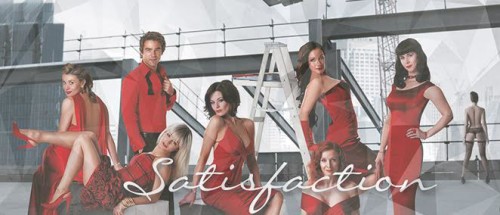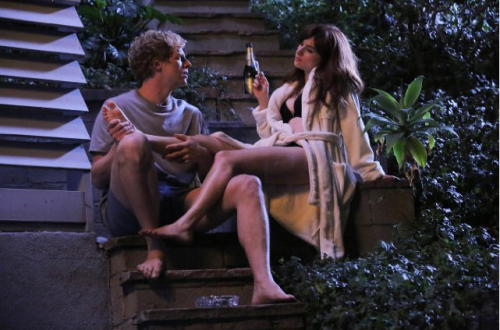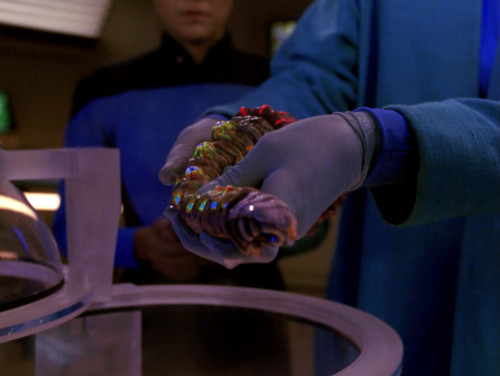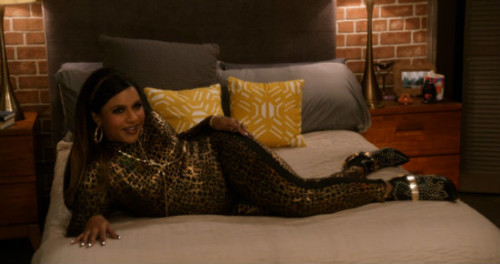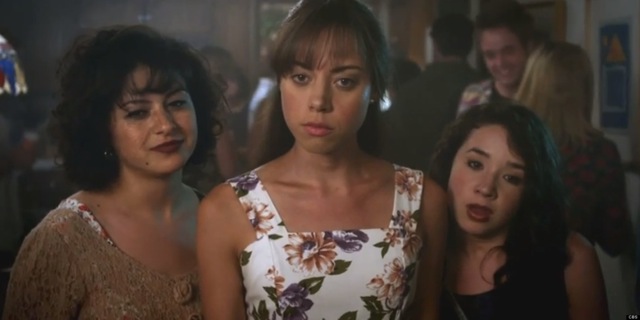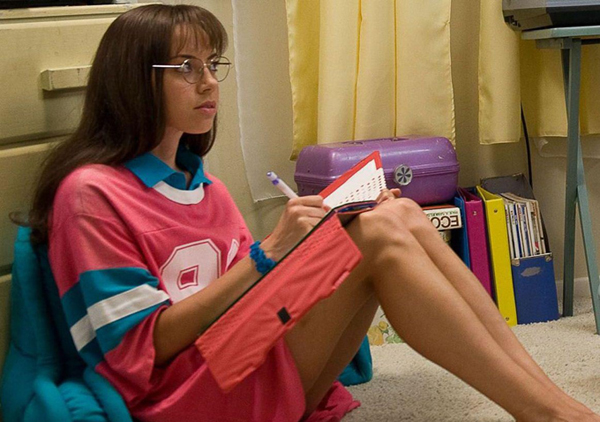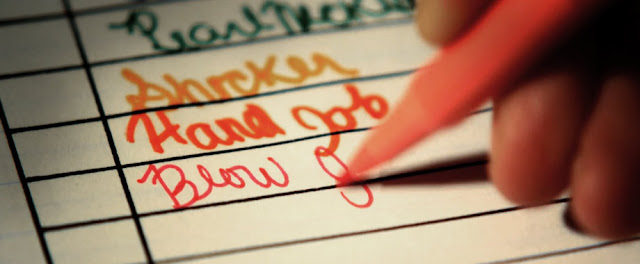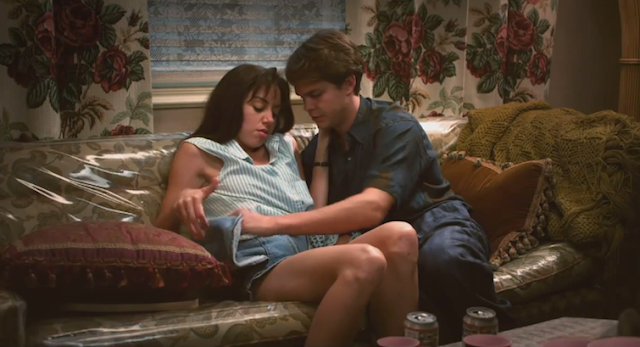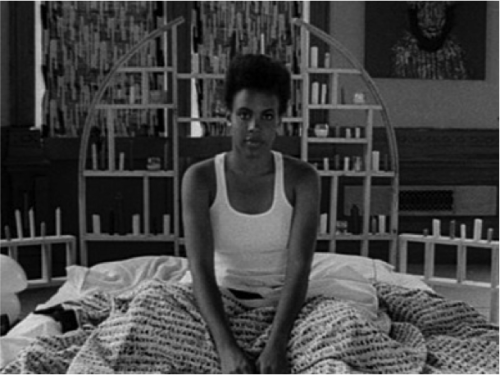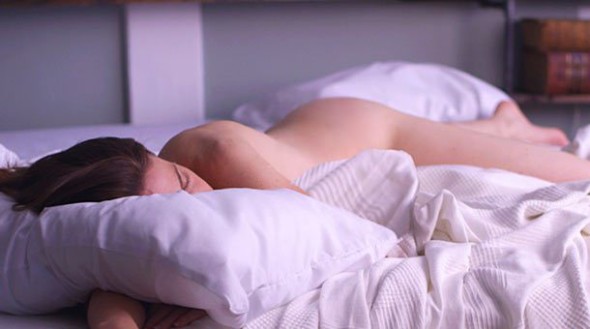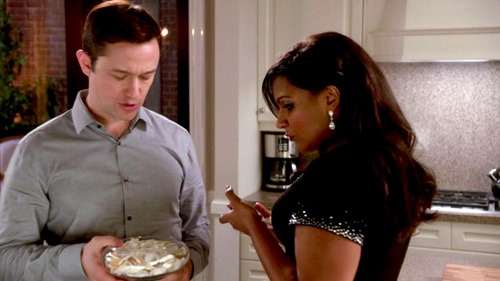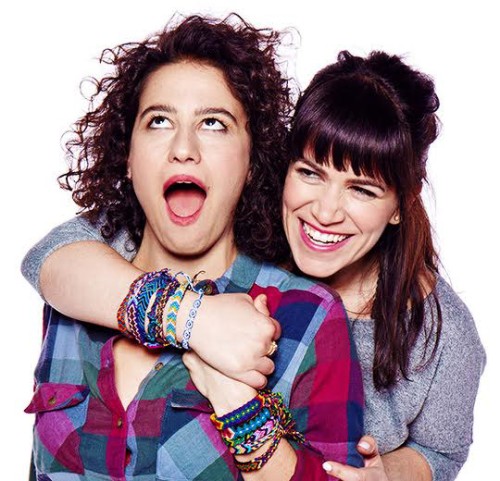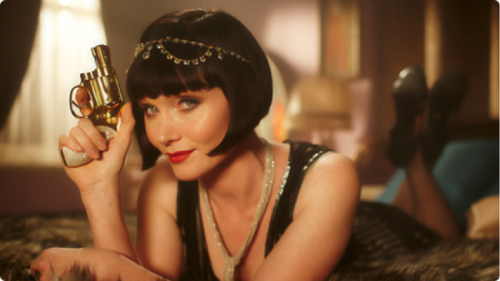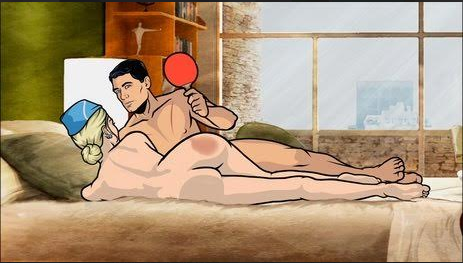This guest post by Cameron Airen appears as part of our theme week on Sex Positivity.
There aren’t a lot of positive portrayals of sex work in film and television. Sex workers are typically seen as less than human–their lives disposable. The sex worker is often an object used for men’s domination, to shame her for the work she partakes in, or to be feared and avoided like she has the plague. How many times have we heard a woman in a film or TV show express something like, “Oh my god, I look like a whore!” or “She’s a whore!” in total disgust? It happens more often than we are conscious of because whorephobia and the stigma of sex work is deeply pervasive. We’ve been taught from the beginning not to look, or act like or be a whore. Being a whore is thought of as the low of the low; it is a shameful position in society.
Because sex workers are seen and thought of as inferior, violence against them is seen as normal, like we see in the film Dressed to Kill (1980) where a serial killer psychiatrist specifically targets sex workers. If a sex worker is not the target of violence, then they’re being objectified like in the recent film The Escort (2015) where Lyndsy Fonseca plays a sex worker whose story wants to be written by a white man. With the title “The Escort” you might think it would be HER story but she ends up being the pawn for his interesting journalism further perpetuating what the media does to sex workers consistently, objectifying them, which further perpetuates the stigma of sex work. But, I have good news.
One of the few shows that depicts sex workers in a positive way by challenging stereotypes of sex workers and the sex industry is the Australian drama, Satisfaction. Satisfaction centers on a circle of six women who work out of an upscale, legal brothel in Australia (where sex work is legal but its regulations vary regionally). The show doesn’t only focus on their sex work, but their friendships with each other, their personal sexual and romantic interests, and other parts of their lives unrelated to sex work. Satisfaction shows a realistic experience of sex work (for more privileged workers anyway), of sex workers’ clients and situations. Not every work situation turns out to be a positive one for these sex workers, but most do. It shows an assortment of realities that happen within sex work like clients falling in love with a sex worker or vice versa, the various fetishes that clients possess, coming out to loved ones about doing sex work, and dozens of dozens more. Also, safe sex is portrayed in Satisfaction by showing the workers doing STI checks on their clients before each session. When do we ever see safety around sex onscreen?
“People pay me to have sex with them, and yes, I’m OK with that” –Lauren
Satisfaction offers a variety of personalities and representations of its main characters. It gives older sex workers a voice with characters like Lauren, a receptionist of the brothel who picks up sex work after discovering that she has a knack for it, and Mel, an independent sex worker. It represents the kink side of sex work through Heather, who works as a Dominatrix, and Nat, who explores her kinky sexuality. Chloe, “the best sex worker in the brothel” as Nat describes, has been in the business a long time and is a mother of a teenage girl. A younger and more intellectual type of worker is played through Tippi, a bubbly girl who wants to study creative writing. The brothel is owned by Nat’s dad but Nat manages it with a strong business intent. Satisfaction also adds a male sex worker in season 3 showing some diversity among gender.
Heather, a lesbian Dominatrix
I do want to point out that Satisfaction is not as diverse as it could be. Heather is the only prominent gay character and sex worker of color. The rest of the women are white and heterosexual. All of the women are in a more privileged position in the sex industry. They have the privilege of working out of a safe and structured, fancy brothel, where clients are screened, instead of on the streets. Plus, they have the privilege of working in a region where sex work is legal. There is a new character in Season 3 who struggles financially, but up that point, no one else seems to struggle to pay the rent or bills on time. The show also lacks the representation of trans or genderqueer sex workers.
A great aspect of Satisfaction is that it focuses on and normalizes fetishes. When do we ever see sexual fetishes portrayed in a positive light onscreen? Fetishes are seen as a normal part of a person’s sexuality, and not just among the clients but among some of the women as well. It’s another way the show defies sexual and gender stereotypes and gives kink a voice.
Nat, manager of the brothel and latex Queen
While the last season of Satisfaction took a downturn overall by subtracting familiar characters and adding new ones, it explores one of the more interesting sexual expansions of one of the main characters, Nat. In Season 1, Nat, discovers her sexual appetite for latex. In the “Rubber Dubber” episode (Season 1, episode 7), Nat is intrigued by a client of Heather’s who enjoys being wrapped up in latex from head to toe. As she escorts the client in and out of the room, she is excited by the smell of latex and her curiosity begins. In Season 2, Mel’s younger brother, Sean, comes to visit, ends up being a sex worker, and crushes out on Nat. For a while, Nat doesn’t know what to do with this new guy pursuing her but ends up trying to date him. Her relationship with Sean leads her even deeper into her kink and fetish desires that has her wanting to open up their relationship. This is another sex positive moment because we hardly ever see people, but women in particular, wanting and initiating an open relationship with their partner onscreen.
Nat and Sean
Season 3 broadens Nat’s sexuality when she starts seeing Bernie, one of Heather’s ex-clients. They end up having a strong S/M connection that allows Nat to explore her relationship to intimacy, fetish, and kink in ways that are more authentic to her. Nat realizes that she needs and wants to be with someone who is more compatible to her desires. This is a great portrayal of showing how women can get their sexual needs and desires met no matter what they may be. Normalizing all sexual fantasies seems to be one of the main themes of the show. Satisfaction offers a lot of varied sex positivity onscreen that centers on women. The show sets an example for what more television shows and films could portray when it comes to women, sexual desires, and sex work.
You can watch all seasons of Satisfaction for free on Hulu.
Cameron Airen is a queer feminist with a M.A. in Anthropology and Social Change who did her ethnography with sex workers in the Bay Area. When she’s not obsessing over women & gender in film/TV, Cameron is trying to create a (mostly) vegan cookbook. She resides in Berkeley, Calif. You can follow her on Twitter @cameronairen.
